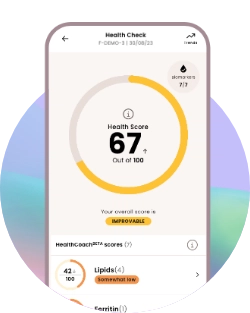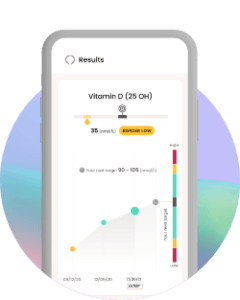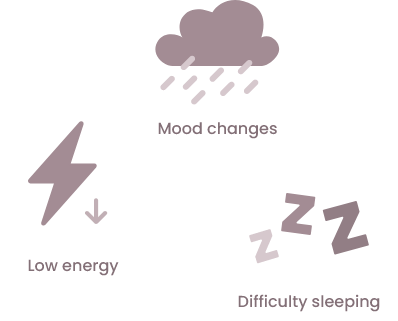About flexible subscriptions
How does a subscription work?
When you purchase this test subscription plan, we will automatically send you another test kit in a few months. Don't worry - you have full control over when this will be, and you can change/cancel it anytime.
When you first purchase this test, you can choose your subscription options in the checkout. We do this, because we recommend taking multiple tests over time to track how your biomarkers change. You'll be charged per test kit (rather than monthly, for example).
Why subscribe to multiple tests?
One test will show you what areas you need to focus on, continued testing will help you learn how your training, diet and lifestyle is impacting your health.
How often should I test?
We recommend a follow up test 3 months after your first test, followed by a test every 6 months depending on your results, but its up to you!
Can I change what's tested in future tests?
Yes, you can tailor/customise subsequent tests (via your app) to focus on just the areas that need improving.
Cortisol Blood Test
If you are feeling constantly tired, experiencing mood changes, poor sleep or frequent illness then your body could be under too much stress. Our cortisol blood test will identify if you have high levels which could be contributing to your symptoms.
Validated & analysed by NHS Lab
Finger prick or venous collection
Doctor reviewed
Results in 2 working days
£41
Shop now. Pay over time with Klarna
Klarna available at checkout.
Klarna's Pay in 3 / Pay in 30 days are unregulated credit agreements. Borrowing more than you can afford or paying late may negatively impact your financial status and ability to obtain credit. 18+, UK residents only. Subject to status. Ts&Cs and late fees apply.
What gets tested?
1 Biomarkers
Blood sample collection options
How does it work?
When do I take the test?
Your cortisol levels should be at their highest level first thing in the morning and gradually reduce throughout the day. So, the cortisol test is best taken before 10 am or, if you work shifts, or are a very early riser, within 3 hours of waking.
Certified for quality & security
Blood sample collection options
You can choose your preferred collection method when you checkout
Finger prick kit (FREE)
You can do this test at home without the need for a doctor. We'll send you everything you need to collect your sample and post it back to us. And it's all included in the cost. We've put together a video that covers the process, making it easy to check and track your health from home.
Home nurse appointment (+£60)
We'll arrange for a medical professional to visit your home and collect your sample. This is great if you're unsure on how it all works or have trouble collecting a sample. No need to book a doctor's appointment or visit a clinic, we'll send you everything you need to collect a sample and post it back to our labs.
Visit a partner clinic (+£45)
Once you've ordered your test, look out for an email from our phlebotomy partners containing information and a link to book your appointment. We'll send you everything the clinic will need to complete the sample and post it back to our labs.
Organise a nurse myself (FREE)
If none of the above options work for you, you can arrange your own medical professional to collect your sample. There is no additional charge for this. Once you've ordered your test, we'll send you everything you and your chosen medical professional will need to collect a sample and post it back to our labs.
Still unsure how it works? You can find more information on collection methods and the service we provide in our 'How it Works' section.
How does it work?

1. Choose your blood test
No need to wait for a GP appointment, choose from our wide range of tests which come with everything you need to take your sample and return to our lab.

2. Collect your sample
Take your finger prick blood sample at home, or choose to have your blood taken at a Superdrug health clinic or a nurse at home. Return to our NHS lab using our prepaid envelope.

3. View your results
View your results on your secure health dashboard within 2 working days of our lab receiving your sample. Read personalised comments from our GPs.

4. Make improvements
With more in-depth results, you will be able to identify areas that need improving. Make the changes and track your progress.
What gets tested?
1 Biomarker Included
Additional biomarkers can be added by personalising this test.
What are biomarkers?
Biomarkers are specific compounds we can detect in your blood sample that reflect different things about your health. Your test will tell you your levels for each of the above biomarkers, and whether they are in a normal range.
Did you know?
74% of people feel so stressed they have been overwhelmed or unable to cope
Mental Health UK: Stress and how to cope with it
What is a cortisol test?
A cortisol blood test checks the levels of cortisol in your blood, which can be an indicator of stress. Testing your stress levels can help identify why you’re feeling tired, aren’t sleeping well or are having mood changes.
How to test cortisol levels at home
Your cortisol levels rise and fall throughout the day, but are highest in the morning, when you wake up, so it’s best to collect your blood sample before 10am or within 3 hours of waking up. Our cortisol blood test kit has everything you need to collect a blood sample at home, including free return postage to our labs. Our doctors will review your results to provide feedback on your levels and advice on how to improve them.
What are the symptoms of high cortisol levels?
Consistently high cortisol levels can be bad for your health. Symptoms of high cortisol include:
- Weight gain
- Muscle weakness
- Skin changes
- Hypertension (high blood pressure)
- Irregular or absent menstrual periods
- Increased thirst and urination
- Fatigue
- Changes in mood
- Sleep disturbances
- Cognitive difficulties
- Decreased libido
Frequently asked questions
This is what our customers ask us most about this test. For more information, try our help centre.
What is cortisol?
Cortisol is a steroid hormone produced by the adrenal glands. Abnormal cortisol levels can lead to health conditions.
Cortisol impacts:
- effective metabolism of glucose
- blood pressure
- inflammation reduction
- your response to dangers
How can I lower my cortisol levels?
Lifestyle changes can help to control cortisol. Diet, exercise and stress-relieving exercises can all help to keep stress and cortisol levels down.
Mindfulness-Based Stress Reduction Programmes can help to improve the way the body deals with stress. Exercises such as yoga, Pilates and meditation may be beneficial, too. If you can try to take yourself away from the situation which is causing you stress.
What are good cortisol levels?
The normal range for Cortisol is 160 – 600 nmol/L.
What causes high levels of cortisol?
Cortisol is known as the “stress hormone”. When we experience stress, our body will produce more cortisol in response.
High training load in athletes can also increase cortisol levels in response to the stress the training is putting on your body.
How soon will the test arrive?
If you order your test before midday on a Monday to Friday then your kit will be dispatched
the same day.
All our kits are sent out via Royal Mail first class post, so it should be with you within 1-2
working days.
How secure is my data?
We have strict processes in place to ensure the protection of your data. Following GDPR the company also operates under tight legal rules about the sharing of data which ensures that data is only shared if it is crucial to the delivery of our service. For example, our doctors see customer results at the time of review, however, after review, access to results is withdrawn.
Learn more about your data security.
Can I have someone take my blood for me?
Yes. We offer two options if you do not want to do our finger prick test. The first is a home appointment where a nurse comes to your home to take a blood sample. The second is to visit a Phlebotomy clinic near you that offers a blood sample service.
A blood sample will be taken from your vein and we will provide you with everything you need to give to the nurse to allow them to take the sample.
The nurse will give you the blood sample to return to us using the pre-paid envelope provided.
Does a doctor review my results?
We have a team of doctors and nurses who look at all results and will comment on any results that are outside of the normal range for your age.
Can I download the results to share with my GP?
Yes, you can download your results from your health dashboard as a PDF to share with your GP.
Learn how to export your results.
We are dedicated to supporting you on improving your health
Go to help center
Cortisol Blood Test, recommended by our doctors
"Everyone's life has got unbelievably busy, a cortisol blood test offers insights into stress levels. It also guides stress management, optimising overall health and well-being. It's a vital tool for proactively managing stress levels, and assessing your sleep and recovery."
Dr Thom Phillips
Similar tests
- Health scores calculated
Close
We're changing people's lives
How our Cortisol Blood Test works
Getting the insights you need to improve your health has never been easier.

1. Choose your blood test
No need to wait for a GP appointment, choose from our wide range of tests which come with everything you need to take your sample and return to our lab.

2. Collect your sample
Take your finger prick blood sample at home, or choose to have your blood taken at one of our partner clinics or a nurse at home. Return to our NHS lab using our prepaid envelope.

3. View your results
View your results on your secure health dashboard within 2 working days of our lab receiving your sample. Read personalised comments from our GPs.

4. Make improvements
With more in-depth results, you will be able to identify areas that need improving. Make the changes and track your progress.
What's included in this test?
1x Yellow Tube
3x Lancets

1x Cleansing wipes

Plasters

2x Alcohol swabs
1x Return pouch

1x Tracked 24 return envelope

1x Lab request form
Blood sample kit
Results within 2 working days
Tracked 24 delivery & return
Secure health dashboard
Accredited lab analysis
Doctor reviewed results
Our impact in numbers...
70+
From hormones to nutrients, we offer 70+ different tests
60,000+
We've helped over 60,000 people improve their health
800,000+
We've delivered over 800,000 test results
Related articles
Like this article? Here are some more based on similar topics.
Cortisol Blood Test













